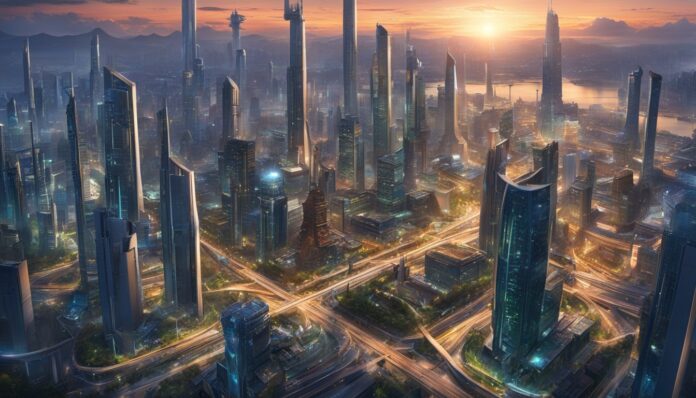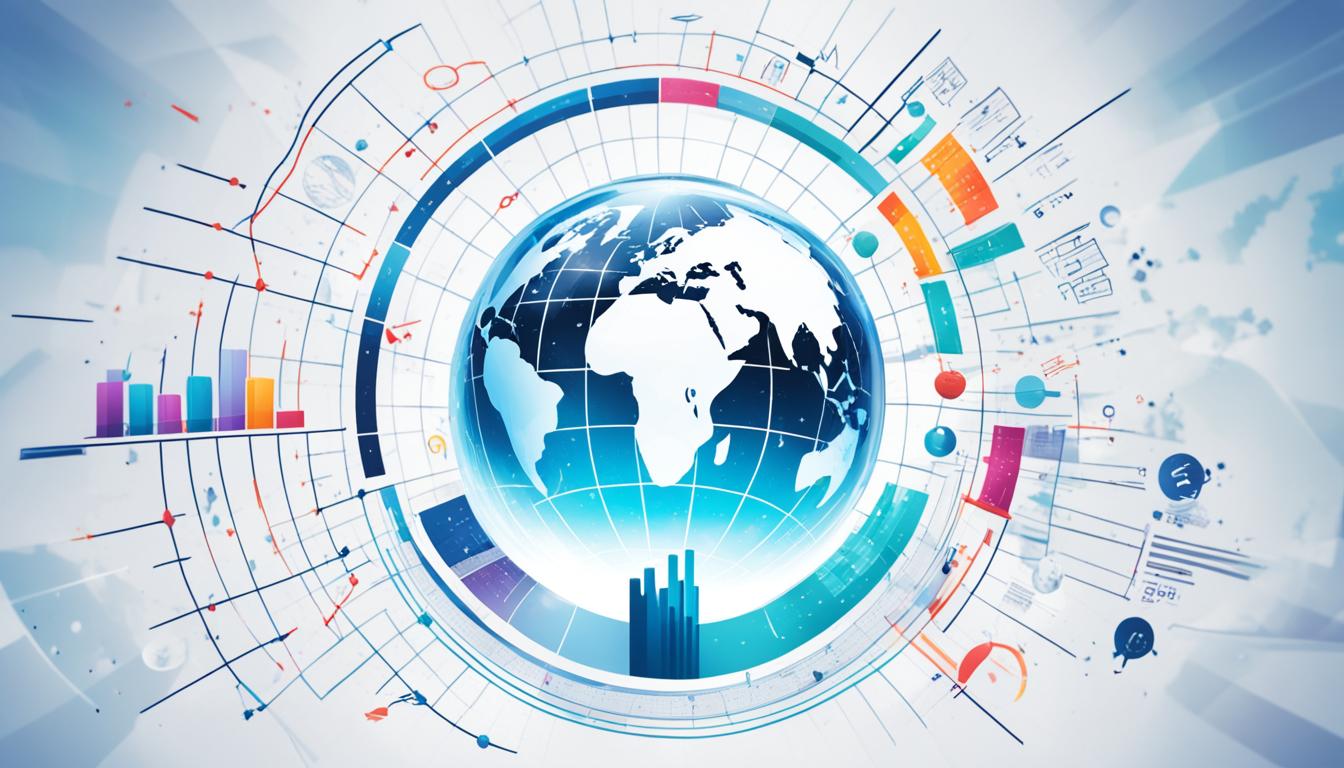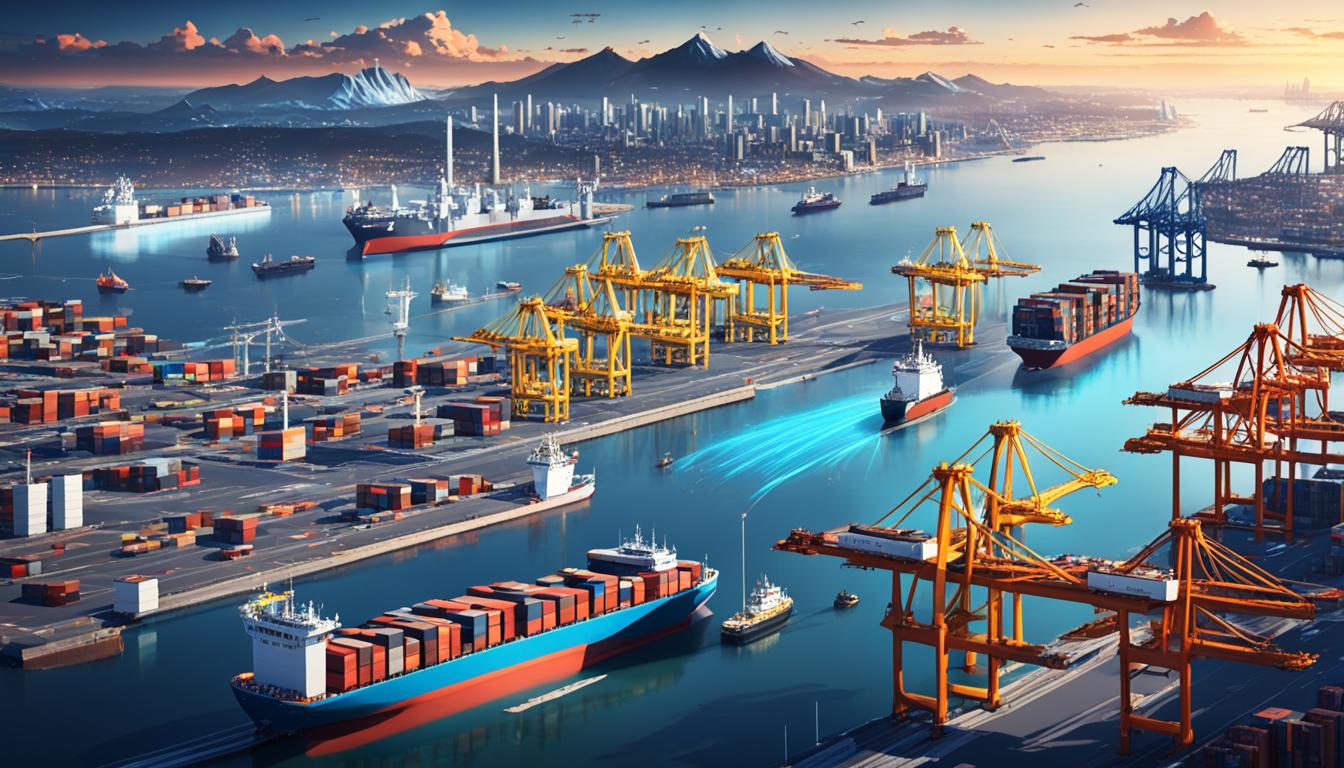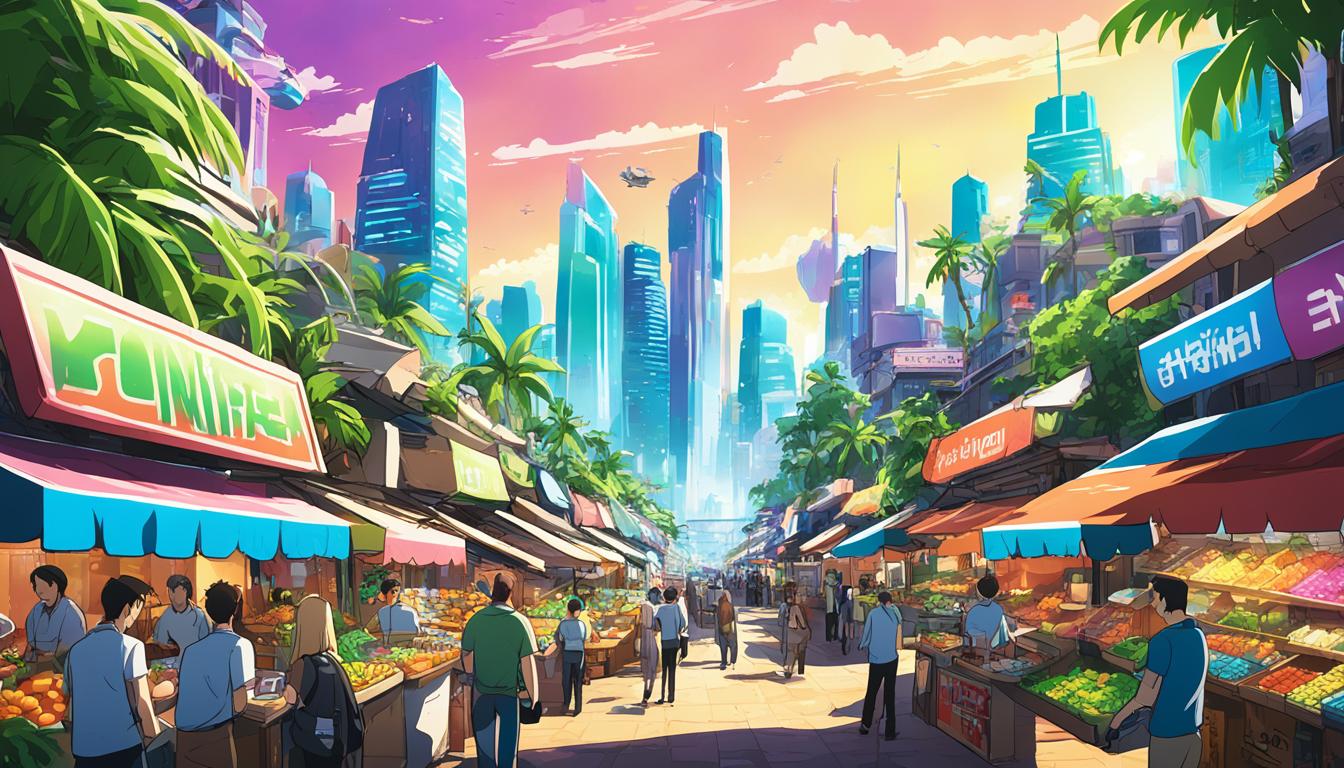
“The best way to predict the future is to create it.” – Peter Drucker.
Looking ahead to 2025, we see a mix of hope and challenge in the world’s economy. Major changes are set to transform society. New technologies and shifts in how we do business will be key.
Capitalism is changing, adapting to meet today’s demands, thanks to technological progress. This change is led by the expansion of smart tech and the use of ethical AI. These advancements aim to make our lives safer and more efficient.
Now, after the Trump years, there’s a big focus on making technology and security better. We’re fighting to reduce harm from bad tech uses.
Cities are getting smarter. They’ll use AI to be better at handling emergencies and promoting fairness. The future calls for creative problem-solving to make the world better for everyone.
Key Takeaways
- Tech advancements and market capitalism reinvention are set to reshape the global economic outlook by 2025.
- Growth in smart technology and ethical AI principles will drive safer and more humane developments.
- The post-Trump era anticipates improvements in tech practices and limitations on malicious actors.
- Smart cities are projected to revolutionize urban living and emergency response capabilities.
- Shifts in tech companies focus on promoting social justice and addressing the impacts of rapid digital communication.
Economic Forecasting: Predictions and Trends
The forecast for the years ahead shows a mix of challenges and chances worldwide. Advanced economies are set to grow steadily, while some new markets might slow a bit. Yet, we see a trend where Europe and the U.S. are sharing similar economic stories. This may help balance their performance differences.

Global Growth Projections
Global growth is expected to stay steady, with leading economies staying stable and emerging ones possibly slowing. This convergence could shape economic paths, guided by policies, technology, and global stability. Progress on Sustainable Development Goals (SDGs) is also vital. It ensures growth respects our planet and society, aiming for long-term harmony.
Sector-Specific Analysis
Technology heavily influences sector-specific progress. Areas like healthcare, finance, and manufacturing are seeing more high-tech integration. This leads to better efficiency and outcomes. These advancements are not only changing markets but also dictating trends in emerging regions. Alongside, there’s a surge in adopting sustainable goals, pointing towards a future with eco-friendly and responsible economic choices.
The table below will give you a clear view of sector forecasts and global growth trends:
| Sector | Key Trends | Technological Influence |
|---|---|---|
| Healthcare | Telemedicine growth, AI in diagnostics | High |
| Finance | Digital banking, blockchain integration | Very High |
| Manufacturing | Automation, smart factories | High |
Summing up, forecasts suggest growth is on track for richer nations but a bit slow for new markets. Yet, tech-led changes promise big shifts in different fields. This blend of innovation and focus on being green underlines where global economy trends are heading.
The Future of International Trade
International trade is about to change a lot in the next few years. This change comes from things like geopolitics, new technology, policy shifts, and different trade partners. It’s important for countries to understand how these factors affect trade growth.

Impact of Geopolitical Dynamics
Geopolitical events greatly affect international trade’s future. Tensions between big global players can slow down trade and cause uncertainty. Political decisions like tariffs and sanctions can shift trade partners often.
The trade ties among the U.S., China, and the European Union can quickly change. These changes affect economic policies and strategies worldwide, like a ripple effect.
Technological Innovations in Trade
New technology is changing how global businesses work. Tools like AI and remote work are improving efficiency and accessibility of international trade. They boost trading partnerships and productivity.
Blockchain is enhancing transparency in supply chains and cutting down on fraud. These new technologies improve trade transactions by making them smoother and more secure for the future.
| Key Factor | Impact on Trade |
|---|---|
| Geopolitical Dynamics | Influences policies, creates uncertainty, affects exchange rates |
| Technological Innovations | Enhances efficiency, opens new markets, reduces costs |
| Economic Policies | Shapes trade agreements, tariffs, and regulatory frameworks |
| Trading Partnerships | Facilitates global reach, encourages collaboration, boosts economies |
Technological and geopolitical changes will deeply impact international trade’s future. As they evolve, these elements will shape new economic policies and trade partnerships around the world.
Emerging Markets and Their Role in Shaping 2025’s Global Economy
As we look ahead to 2025, emerging markets stand out in the world’s economic map. The time after the pandemic kick-started big changes. This includes new approaches to growing and adapting our economies. A key part of this shift is how our workforce is changing. This change is all about getting better at going digital and working from far away.

Emerging Markets and Their Growth
Emerging markets are set to grow a lot because of smart and creative economic moves. Going digital and using tech in business is now common. It’s making a place where investing and growing as a region are encouraged. These moves show why it’s vital to have good plans for growth. With the right strategies, economies can keep moving forward steadily.
Post-Pandemic Recovery Patterns
After the pandemic, emerging markets have shown they can bounce back and change. They’re mixing old and new ways of working and improving their tech networks. This is not just about getting the economy back on track. It’s also about making jobs more flexible and welcoming to everyone.
Focusing on how to adapt our economies and workforces is key. It shows the big part that emerging markets will have in 2025’s global economy. Today’s forward-thinking efforts will shape the stories of our economies tomorrow. We’re looking at a future that’s all about growth and new ideas.
Technological Impact on Economies
By 2025, technology will change our global economies in big ways. Things like artificial intelligence, digital changes, and smart cities will create new economic worlds.
Role of Artificial Intelligence
Artificial intelligence will deeply change many sectors. It will revolutionize global finance, speed up tech economic growth, and boost competition. AI will automate finance tasks and use predictive analytics, leading economic progress.
Digital Transformation Across Sectors
Digital change will enter different fields, making them more productive and innovative. Companies will use digital tools to make work smoother and to allow remote work. This change might lead to models that are both faster and more adaptive.
Smart Cities and Urban Development
Smart cities will change urban living with smart use of technology. They aim to make cities better to live in and sustainable. These cities will handle things like transport, managing resources, and public services in new ways. They will help grow economies through technology.
The following table provides a glimpse into the technological impact on economies and key areas of transformation:
| Key Areas | Technological Impact |
|---|---|
| Artificial Intelligence | Transforms finance, enhances competition |
| Digital Transformation | Improves productivity, enables remote work |
| Smart Cities | Optimizes urban living, boosts sustainability |
Sustainable Development Goals and Their Influence
Sustainable development goals are key in today’s economic strategies. They push for eco-friendly economic policies on national levels. This pushes up green technology investments significantly.
Aligning with the sustainable development goals is not just a moral imperative but, crucially, an economic one.
Companies are getting more sustainable because of social and future-planning demands. They see good profits and reputations from social responsibility and green actions.
Global efforts to help the environment go beyond one country’s policies. They touch trade and how we govern. More work on SDGs shows the world wants to be green, from what we buy to how companies are run.
Green policies and green technology investments will change the global market. More countries are serious about these goals. This highlights the need to work together for a sustainable, better future.
Conclusion
Looking ahead to 2025, big changes are coming to the world’s economy. These shifts are being pushed by new technologies, changes in how we make policies, and a focus on being greener. In the next few years, our economy will get better if we start using new tech more and come up with clever ways to do things. It’s all about working together to solve worldwide problems and using smart leaders to make our economy strong and fair for everyone.
New tech like artificial intelligence, the move to more digital ways, and investing in green options are key. Everyone, from businesses to governments, should be ready to face the world’s problems with smart and kind plans. Mixing goals for a cleaner future into how they work will help companies do good for society and the planet. This is how we’ll create an economy that cares about the long haul.
We’re on a path to make our economy better by embracing tech and new rules. With a focus on being creative and caring for the environment, our economic story can change for the better. By being smart and moving forward quickly, our economies can be strong in a ever-changing world.
FAQ
What does 2025 hold for the global economy?
In 2025, big changes are expected in the global economy. These will be driven by new technologies and a focus on sustainability. Market capitalism will be reinvented; smart cities will rise.
What are the global economic growth projections for the coming years?
There’s a forecast for small but steady growth, especially in advanced economies. Emerging markets might see a bit of a slowdown. Europe and the U.S. might get closer in how their economies perform.
How will technology influence economic trends?
Technology will shake up the economy through AI, remote work, and digital overhauls. These changes will boost productivity and innovation. This, in turn, will fuel competition across the world.
What is the future of international trade?
International trade is on the path to growth, but it might hit a bump. This could happen due to too much stock and its impact on investments. Geopolitics and new tech will shape the trade future.
How will emerging markets contribute to the global economy by 2025?
By 2025, emerging markets will be key players in the global economy. Tech growth and recovery after COVID-19 will lead to change. There will also be new ways of working and different kinds of jobs.
What is the expected role of artificial intelligence in future economies?
AI’s role in the economy will be huge by 2025. It will make global finance better, boost innovation, and increase productivity. Is also central to making cities smarter and living spaces better.
How will sustainable development goals influence the global economy?
Sustainable goals will make a big mark on the economy by 2025. There will be a strong move toward green policies and social responsibility. This will change, among other things, how companies are run and what buyers look for.
